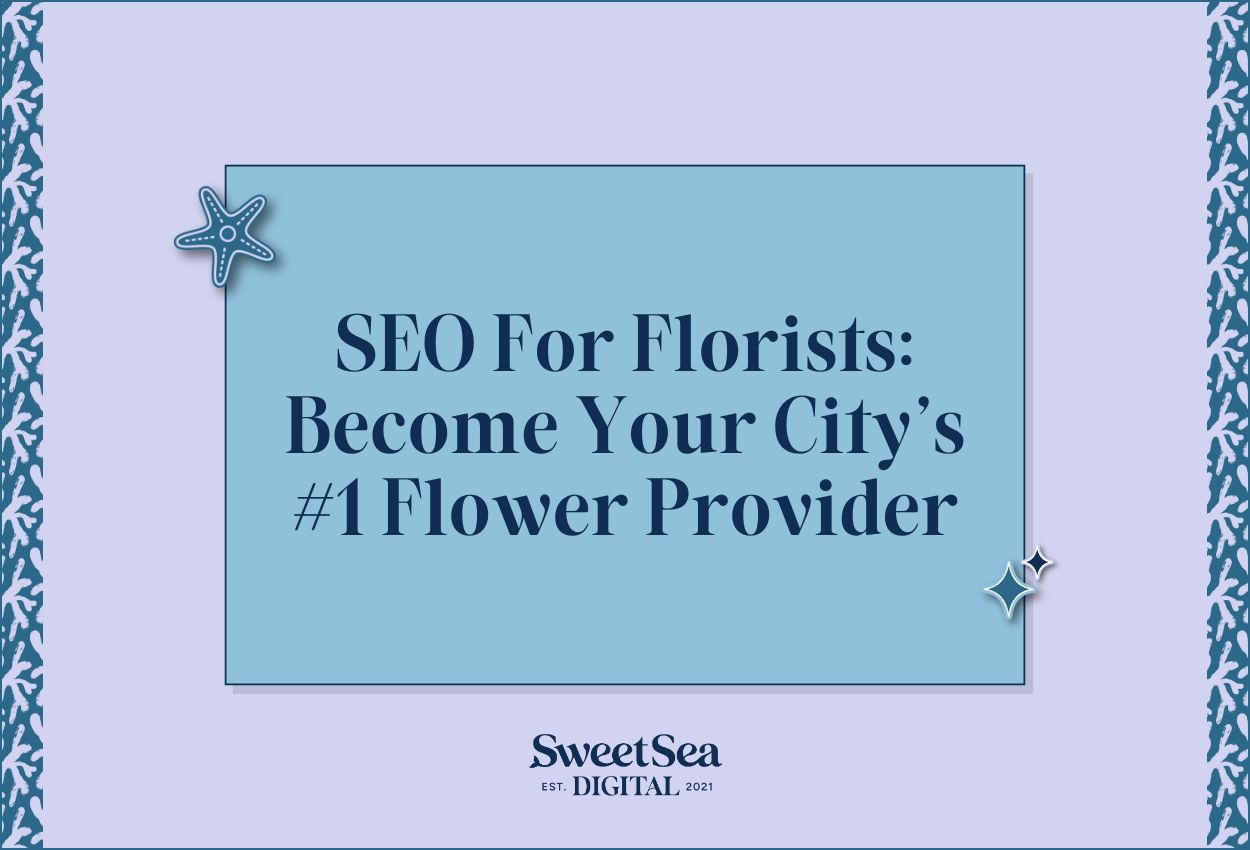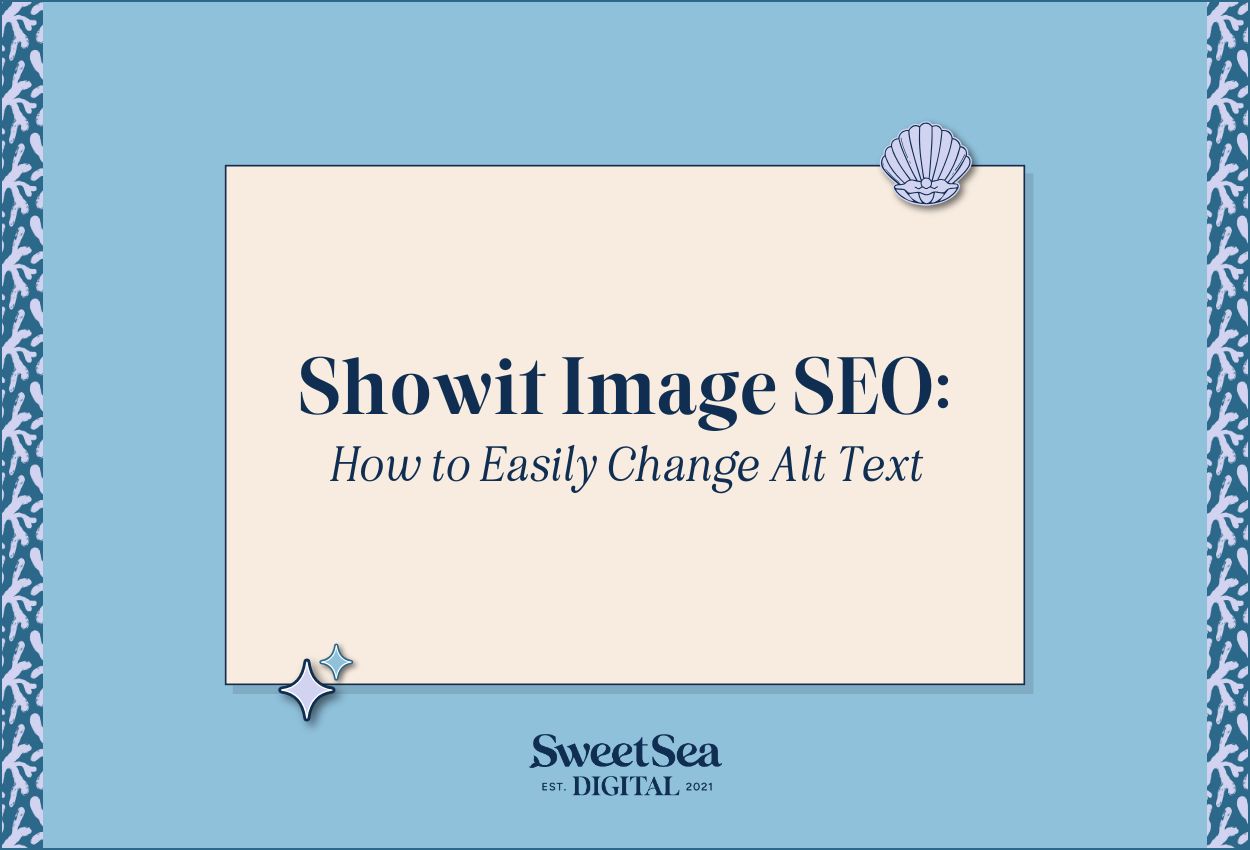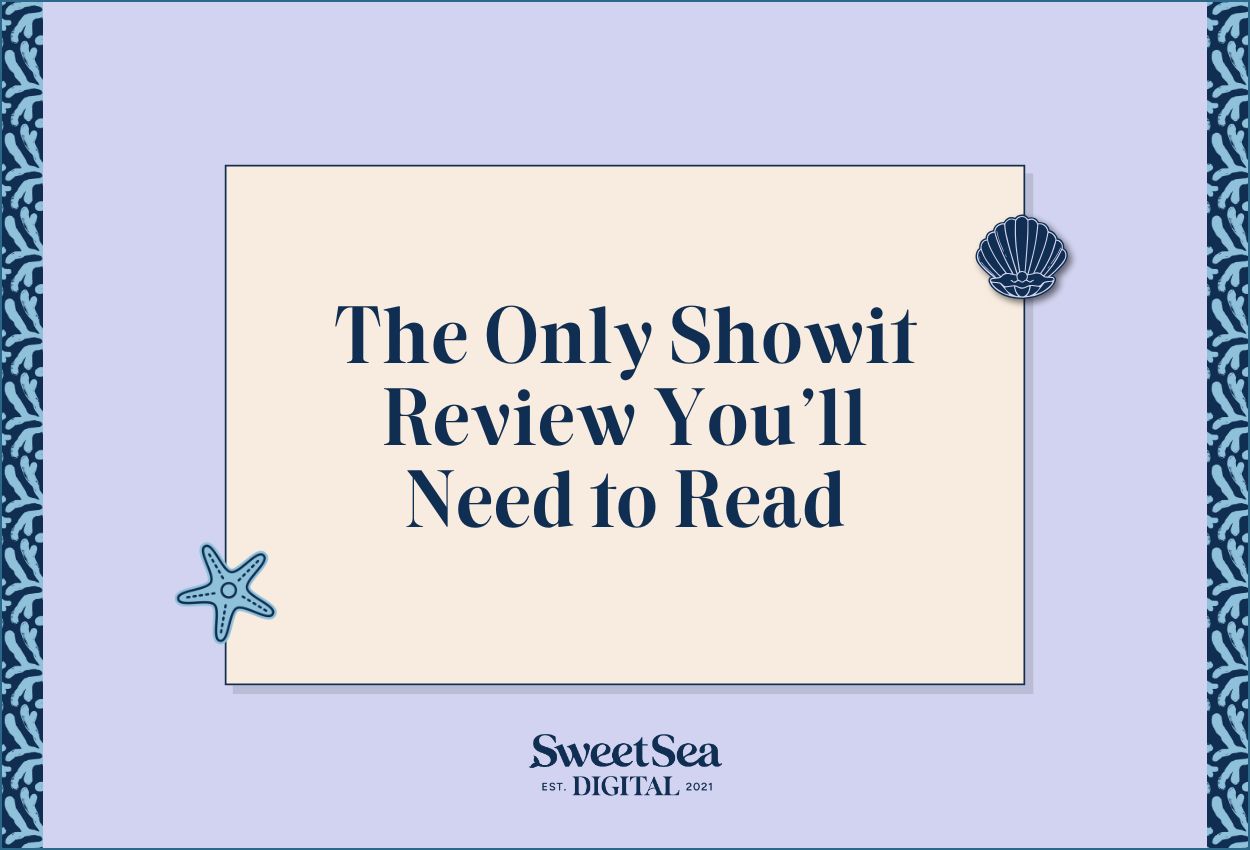Can You Post on Medium & Your Own Blog? An SEO Perspective
By Seren Nurgun,
Founder of SweetSea Digital
By Seren Nurgun
Mar 6, 2024
Salt Your SEO:
Kickstart Your SEO With These 5 Easy Steps!
So you’re thinking about blogging on both your self-hosted website AND Medium? If you’re just starting out, it’s better to choose either Medium or your own blog to start with (preferably your own blog) for the best SEO results at the beginning. But if your own website has more than 50 or so blog posts already, then republishing to Medium would likely be a good idea. Even though cross-publishing from the beginning may seem like the best option to get more visibility on your written work, that does come with several drawbacks you should consider before making your final decision.
Is it better to post on Medium or on my own blog?
For brand new business owners, writers, and bloggers, it’s better to start blogging on either Medium or your own self-hosted website. Why? Well, from an SEO perspective, if you cross-published and Google is only just getting a read on what you’re all about, there’s a high likelihood that Google will get confused about whether to prioritize the blog post on your self-hosted website or on Medium, especially if they’re exactly the same content. Meaning, Google might choose to rank the Medium version of your blog post higher than the one on your own website.
If this happened, you would miss out on the incredibly valuable opportunity to start building your website’s authority, attracting all of that organic traffic to the one online space you have full ownership of, and gaining any backlinks to your website (backlinks are votes of confidence from other websites that Google takes into account when determining where to rank your website). Instead, you’d actually be giving all of that good stuff to Medium.
All of that aside, for brand new business owners, I’d recommend starting to blog on your own website with SEO-oriented topics in mind. By that I mean specific topics you’ve found after doing keyword research. If you’re still eyeing Medium and want to get that going at the same time, I’d recommend writing more freely and not thinking about SEO. Medium is cool in that the platform has a built-in readership, meaning the platform itself helps get traffic to posts (so you don’t really need SEO).
For example, if you were a vegan nutrition coach, you’d want to write blog posts about getting started as a vegan, common mistakes new vegans mistake, easy vegan replacements, etc. on your own website as, even without doing keyword research, I can assure you there’s loads of people searching for these topics! On Medium, you could more-so write posts about the ups and downs of your own vegan journey, things you had to teach your friends about veganism, what you want society to know about vegans, etc. These would come from a personal perspective rather than more of a teaching perspective.
However, if you’re an established writer, blogger, or business owner with a healthy self-hosted blog, then starting to cross-publish might be the best option for you. Because you’ve been around a while, Google likely already has a pretty solid understanding of you and your website. That means the risk of Google choosing Medium over your own website for a blog post published in both places is a lot less. Plus there’s a best practice SEO way to really lower the chances of that confusion that we’ll dive into next.
Should I post on my own blog first and then Medium or the other way around?
Leaning towards cross-publishing your blog posts? To do so without screwing up your SEO, I recommend first publishing on your own self-hosted website and then using Medium’s ‘Import Story’ tool to bring it over to Medium. This way, you don’t have to worry about duplicate content issues hurting your SEO because Medium automatically takes care of that issue for you.
Medium is unique in this way because many other platforms (like Substack) don’t have this feature – probably because they really want you and your readers to stay on their platform.
How do I publish blog posts on Medium without screwing up my SEO?
Understandably, you don’t want to mess up or damage the SEO you’ve been painstakingly improving all this time. You might be worried about something called duplicate content, which is two or more identical or highly similar published pieces of content. In this situation, the problem from duplicate content comes when Google gets so confused that it penalizes the less trustworthy website.
As Medium has lots of authority and trust built up over multiple years, it’s more than likely that if you published an identical piece of content on both Medium and your blog and didn’t follow SEO best practices, then Google would prioritize Medium’s version.
So, to cross-publish without any duplicate content issues, what you’ll actually be doing is creating syndicated content. Syndicated content just means a specific piece of content that’s published by more than one publisher. And to ease your mind, many big names in the online business and creator space, including James Clear (author of Atomic Habits), have used syndicated content and gotten amazing results.
The easiest way to do it without screwing up your SEO is through Medium’s ‘Import Story’ feature. This automatically applies a tag to your Medium post telling Google that the original version of the post lives on your self-hosted website. That way, the Medium version of your blog post and the original blog post won’t compete in Google’s eyes.
Is Medium good for SEO?
Definitely yes, Medium is the 407th most visited website in the entire world (based on SimilarWeb data) and has an authority score of 89 out of 100 (based on SEMrush data), which is really high and notably difficult to achieve.
Pair this with Medium’s innate discoverability features that promote different writers, cross-publishing on Medium is definitely attractive.
However, I should note that Medium isn’t good for your SEO. As in, cross-publishing on Medium won’t really benefit your own website’s SEO because Medium isn’t sending much, if any, traffic to your own website.
Medium’s good SEO on the posts you publish there may boost your brand awareness, which may lead to more people searching for your own website, but that’s an indirect, long-term benefit.
Does Medium own writers’ content?
No, Medium gives writers and publishers full copyright over all original work. You can add, edit, and delete whatever you want that’s 100% yours. However, in their T&Cs, Medium retains the right to modify or present your original work in any way it’d like. The reason Medium gives is they need to be able to publicly distribute and share your original work.
It’s also important to note that Medium has a strict duplicate content rule on the platform. You can’t copy and paste from other peoples’ posts or copy and paste from a post you previously published. It’s clear they really want all content on the platform to be 100% original, so be aware to avoid suspension!
So, is it worth writing on Medium?
It depends! If you want to cross-publish, are you ok with the possibility of Google ranking Medium higher than your own self-hosted blog posts? If you just want to choose one platform, then consider the main pros and cons:
Pros of Only Publishing on Medium
01. Publishing would be a lot more streamlined
You won’t need to worry about another place to publish your blog posts, so eventually publishing on Medium will become second nature. You won’t have to think about all of the additional steps that come with cross-publishing.
02. Immediate access to millions of potential readers
Focusing solely on Medium will ensure you’re totally focused on gaining more visibility and readers through the Medium platform. If you’re starting from scratch, this is definitely a big plus.
03. Medium is easy to use
With a self-hosted website or blog, there are several things you would need to do to get your SEO in good shape. Some technical, some content-related. But with Medium, all of the important things are taken care of for you so you wouldn’t need to worry about all that stuff.
Cons of Only Publishing on Medium
01. You would build on rented land
Medium is rented land because you don’t own the platform, only your original content. There have been many stories of big Medium publishers’ blogs getting shut down accidentally or even on purpose. And some have even gone weeks without getting their access back! These stories prove that building on someone else’s platform can have pretty scary consequences.
02. You can’t really control what people read next
Let’s say, out of thousands of new articles, your most recent post caught someone’s eye. They read it and want to move on, satisfied. If they were on your own blog, it’s more than likely that another blog post of yours will grab their attention and that’s where they’ll go next. With Medium, there are 140,000 new articles published every week!
03. You wouldn’t build authority or compounding organic traffic to your owned land (your website)
Because Medium is its own platform, you wouldn’t be building your own website’s authority, trustworthiness, or expertise. These might sound unimportant, but they’re a big part of good SEO and are crucial to hone in if your goal is to grow a super strong blog (that gets ranked on page one of Google). You’d also be missing out on the compounding effects of SEO that kick into gear once you’ve got a solid library of blog posts up on your own website.
Pros of Only Publishing on Your Own Blog
01. You wouldn’t have to compete for your readers’ attention
Unlike Medium, your own website is 100% yours to do with what you want. That means you can recommend a reader to read other blog posts, sign up to your email list, or even check out something you sell. Because they’ve made it to your blog, they’re obviously highly interested in what you’re writing about and would be more interested in other things you have to offer.
02. You would design everything exactly to your liking
Whether you want to embed a YouTube video, add an email signup box, or make your headings different colors, you can do all that and more on your own self-hosted website. With complete creative freedom, there’s so many design elements you can use to increase time on page, decrease bounce rate, and keep readers happy and engaged.
03. You’d get all of the SEO benefits from having your own website
As you publish and build your blog, Google will take more and more notice of your high-quality content. It’ll start seeing your website as trustworthy and start treating it as such, meaning higher rankings. That means all of the SEO benefits from owning where you publish goes directly to you.
Cons of Only Publishing on Your Own Blog
01. Unless you’re already bringing in readers from somewhere, your visibility would start from scratch
Without Medium’s built-in features helping writers get discovered, you’re completely on your own when it comes to promoting your articles. That means, if you want, you would need to start promoting them on Reddit and social media or set up promotion partnerships or start building an email list that you could then send your articles to.
02. The SEO would be in your hands
With building on your owned land comes doing its SEO. That means your website’s SEO is 100% up to you to implement and if that sounds scary or overwhelming, this is exactly what I help writers, bloggers, and business owners with! Consider having a SEO pro take care of your website’s SEO foundations so all you need to do is publish your posts and wait for that sweet organic traffic to start trickling in.
03. You wouldn’t be able to monetize your writing with Medium’s Partner Program
To join Medium’s Partner Program and start getting paid for your writing, you need to have at least 100 followers, be from an eligible country, and have published at least one story on Medium in the past. So without access to Medium’s Partner Program, you won’t be able to get paid this way.
But keep in mind only about 8% of writers in the program make more than $100 a month, so about 92% make less than that. However, there are many ways to monetize your articles on your own website, like display advertising, affiliate marketing, or selling your own products (physical or digital).
Just for your information, as of writing, eligible countries for Medium’s Partner Program are: Australia, Austria, Belgium, Canada, Czech Republic, Denmark, Estonia, Finland, France, Germany, Greece, Hong Kong, Ireland, Italy, Japan, Latvia, Lithuania, Luxembourg, Mexico, Netherlands, New Zealand, Norway, Poland, Portugal, Romania, Singapore, Slovakia, Slovenia, Spain, Sweden, Switzerland, United Kingdom, United States.
Seren Nurgun
SEO pro and founder of SweetSea Digital, Seren has proudly generated over 278,000 organic clicks from Google and worked with awe-inspiring 6 and 7-figure business owners. Ethical, sustainable marketing is her jam.
Read These Next
Before you go any further…
Hi! I’m Seren, the writer!
Hi! I’m Seren, the writer!
An SEO pro since 2021, I’ve generated over 278,000 organic clicks from Google and worked with 6 and 7-figure business owners. Starting, running, and growing a business definitely isn’t the easiest thing you’ll ever do (to put it lightly), so this treasure trove of blog posts is purely focused on making your life that much easier. You’ve found one of my favorite places on the internet, so I won’t hold you any longer - happy reading!
But first!
Start your SEO journey on strong footing.
Benefit from the free Salt Your SEO guide, weekly newsletters with actionable tips, and some promotions you might not want to miss.
We’re not jerks! Your email will never be spammed, sold, or otherwise treated poorly.

FREE
GUIDE
A Boutique SEO Agency For Woman-Led Online & Local Businesses
A Boutique SEO Agency
For Woman-Led Online
& Local Businesses
who are ready to leverage the world’s
#1 search engine & make sales on repeat.
Navigate
Learn
Let's Connect
© 2021-2025 SWEETSEA DIGITAL, LLC
Brand Photography by Halle Alessia
SITE DESIGN BY CREATE & WANDER
Operating from the unceded ancestral homeland of the Tequesta people
Because we value your trust, we want to share that this page may contain unique affiliate links, which means that we may receive a financial exchange (at no cost to you) if you make a purchase. We only recommend the tools that we actually love and 100% ethically stand behind (because you deserve the best!).


